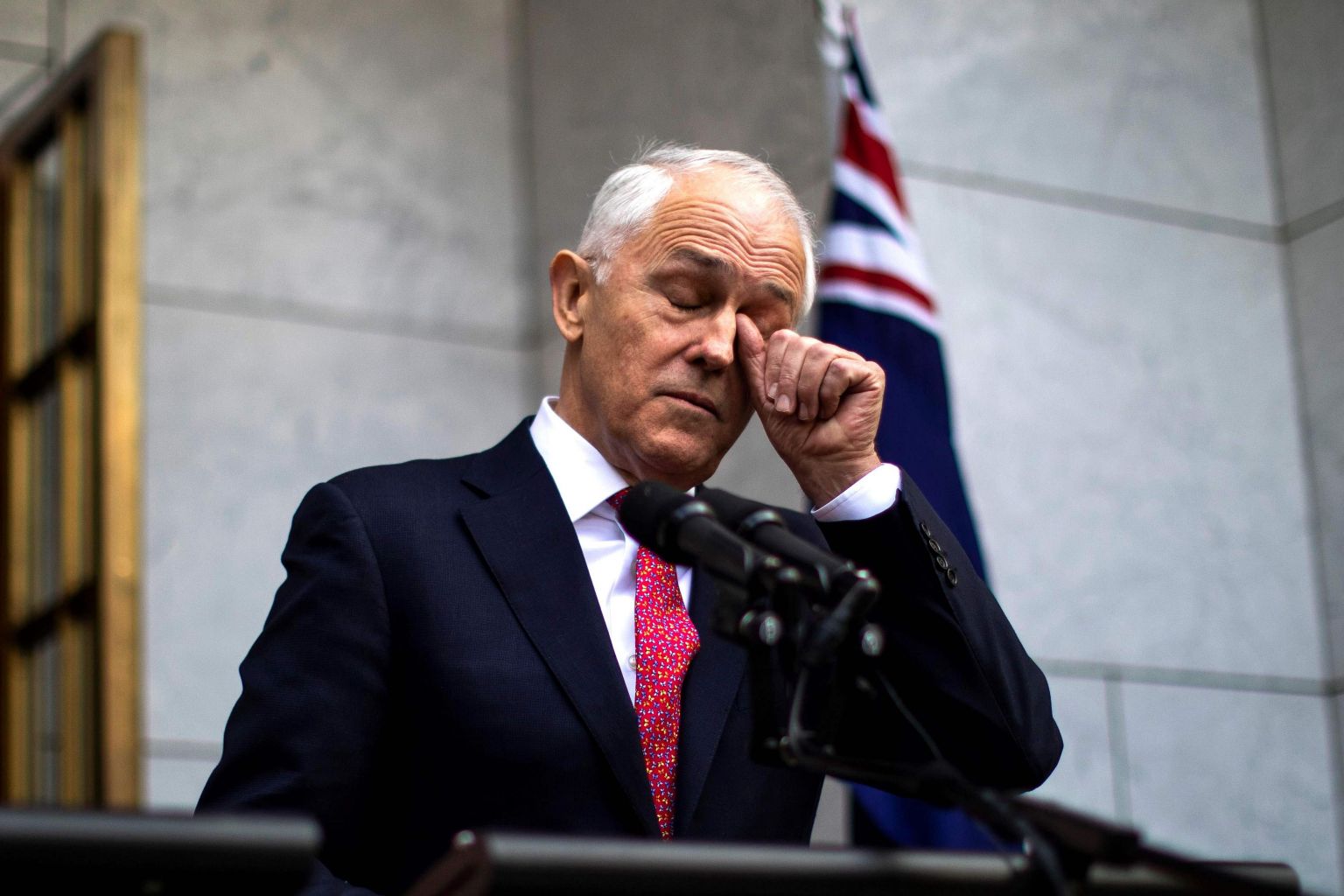Australia PM Malcolm Turnbull under siege as party rebels seek fresh leadership vote
Sign up now: Get insights on Asia's fast-moving developments

Australia's Prime Minister Malcolm Turnbull gestures as he takes part in a press conference in Canberra, on Aug 21, 2018.
PHOTO: AFP
Follow topic:
SYDNEY - Embattled Australian Prime Minister Malcolm Turnbull saw his tentative grip on power slip further on Wednesday (Aug 22), as more than 10 Cabinet members resigned and rival Peter Dutton admitted that he was preparing to mount a second challenge.
Amid speculation that the Liberal Party could face another leadership ballot as soon as today, Mr Dutton, a former home affairs minister, acknowledged that he was trying to win the support of his colleagues.
Mr Dutton challenged Mr Turnbull in a secret ballot on Tuesday and lost 48-35, but the close margin was seen as a sign of the party's lack of confidence in the prime minister.
Mr Dutton admitted yesterday he has been trying to win over another seven MPs to secure victory, telling radio 3AW: "I'm speaking to colleagues. If I believe the majority of colleagues support me, then I will consider my position."
Adding to Mr Turnbull's woes, more than 10 ministers offered to resign, saying they had not backed him in the ballot.
Several claimed they were concerned about Mr Turnbull's commitment to conservative "values".
Only three offers were accepted, including Mr Dutton's.
Mr Turnbull was also forced to abandon his signature proposal to cut taxes for corporations with an annual turnover of more than A$50 million (S$50.2 million). The measure was rejected by the Senate, where the ruling Liberal-National coalition does not have a majority.
Mr Turnbull, a former investment banker, became leader in 2015 after toppling Mr Tony Abbott, a staunch conservative.
But the coalition won the 2016 election with just a one-seat majority, prompting questions about Mr Turnbull's leadership.
The pressure has mounted as opinion polls have repeatedly shown that the coalition is heading towards a defeat at the next election, due by May.
Mr Turnbull insisted yesterday that he had the party's support and was not planning to resign. "The iron laws of arithmetic confirmed my leadership," he said.
But most analysts believe Mr Turnbull is unlikely to survive and that the nation's leadership roundabout will continue.
Both the Liberal and Labor parties have shown a keen willingness to dump leaders if they think it will improve their electoral prospects.
Labor's Mr Kevin Rudd was toppled by Ms Julia Gillard in 2010, who was toppled by Mr Rudd in 2013. The ensuing election was won by Mr Abbott, who was toppled by Mr Turnbull in 2015.
The chaos partly stems from Australian political parties, which traditionally allowed elected MPs to pick their leader. In an era of non-stop opinion polling, this has meant that an unpopular leader could be toppled at any time by MPs nervous about their electoral prospects.
To try to ensure greater stability, Labor has changed its rules to allow all party members - as well as MPs - to have a say in the leadership.
The instability has also been caused by growing debate over issues such as immigration, economic inequality and climate change which, coupled with the fractured media landscape, has increased political divisiveness.
In recent years, overall support for the major parties has plummeted, as have their membership numbers. But analysts also believe that once parties start dumping leaders, it becomes hard to stop.
The coups cause internal divisions and leave the new leader with enemies keen on revenge.
In Mr Turnbull's case, he has been relentlessly criticised by Mr Abbott, who remains an MP.
"Once this process starts, it builds and creates greater bitterness and recrimination within the party," politics expert Mark Triffitt of Melbourne University, told The Straits Times. "We have seen Labor go through it and now the Liberal party are going through it."

